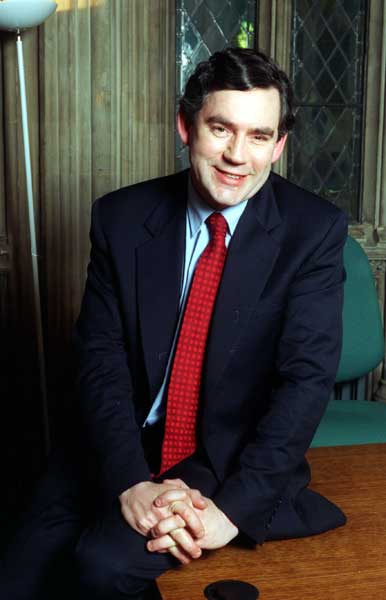Broonland: the Last Days of Gordon Brown, By Christopher Harvie

As adepts of Photoshop endlessly elide the pores of party-leader portraits, and the creaking, shrieking merry-go-round of the general election picks up speed, the citizens deserve nothing less than robust political biography with their cornflakes. This is exactly what Christopher Harvie's Broonland provides, in a capacious critique of this most complex of modern British politicians - whose "last days" may not, even yet, be near.
We open with a comradely vignette of the early Brown, which only throws into relief the gothic labyrinth of his later career. In February 1979, as joint pamphleteers in support of Scottish devolution, Harvie and Brown are battering towards the Glasgow-Edinburgh train when Brown's ancient briefcase bursts open and cascades scholarly papers across the platform. "An epiphany of sorts", writes Harvie, "symbolising the sheer uncontainability of the man's information and ambition – 'an' him no' yet thirty!'" From this warm memory of Brown as "idealistic, generous and anarchic", Harvie sets out to chart his shift from "socialist credulity to capitalist credulity".
Harvie's idiosyncratic public writing - where theoretical haikus, historical filigree and saloon-bar one-liners jostle for prominence (often in the same sentence) - has in the past sometimes lost sight of its chosen subject. But in Broonland, his biographical connection with Brown - both Open University lecturers in the 1970s, both peers of Robin Cook, John Smith and Donald Dewar in the 1980s - turns Harvie into something like a polymathic Jiminy Cricket, perfectly perched at the PM's shoulder.
The narrative takes us from early days and the pact with Blair, through the jamborees of "financial innovation" in London (and Edinburgh), to Brown's strenuous crisis management of the last 18 months. Harvie bristles with objections to Brown's theories and practice that (you suspect) the good professor would love to put to him over a peaty bottle of malt, the cap irretrievably crushed.
As Harvie might say, in his position as professor of British Studies at Tübingen University, he mostly wants to have a Historikerstreit - a historian's quarrel - with his old academic colleague. How could such a self-conscious son of Kirkcaldy, the birthplace of Adam Smith, get the great economist so wrong? How could Brown's mid-noughties boast of "light-touch" financial regulation forget Smith's admonition against the "luxury and corruption" that naturally accompanied "conspiracies of merchants"?
Brown was a biographer of the flawed Labour leader James Maxton. Harvie intriguingly suggests that Maxton's distrust of big money, which veered into anti-Semitism, must have shaped Brown's embrace of the City. The Third Way progressive has to make his peace with cosmopolitan, turbo-charged capital markets, in order to benefit from their monetising autism. Brown trudged regularly to Rupert Murdoch's corporate lovefests, and even brought Alan Greenspan to lecture at Kirkcaldy Town Hall. As Harvie says, perhaps Smith's successor Adam Ferguson - the first analyst of how civil society could break down into in-groups and out-groups - would have been a better guide to the trading tribes of the City of London as they projected totemic power via near-magical rituals of money-making.
Yet Harvie possesses a map to the full hinterland of Gordon Brown. In late 2009, he watches the PM deliver a note-perfect eulogy to NUM leader Lawrence Daly, "alert to the loylaties of the retired miners and their families" seated in the pews of Dunfermline Abbey. Harvie grants "the conviction of the man" - that his legacy would be "a great city state founded on efficient trade, which it would use to ameliorate international divisions".
Yet this strategy is unravelled by the rise of the BRICS and the EU as global economic players. And, more sinisterly by what Harvie calls "illegalism" - when the stakeholders and regulators are chased out of the bazaar, capital flows get flooded with money from all striations of criminality.
Harvie is an SNP member of the Scottish parliament in Brown's own Kirkcaldy backyard: 20-odd years in the engineers' republic of Baden-Württemberg in Germany turned him away from British big-nation sclerosis towards Celtic regional reformism. So he has a predictable disdain for Brown's lumbering attempts to construct a "new collectivity" out of Britishness. But the professor's regret is more that the Brown who wrote The Red Paper on Scotland in the 1970s, and Where There is Greed (an anti-Thatcherite paean to hi-tech industry) in the early 1990s could preside over the final hollowing-out of British manufacturing. Harvie's German experience tells him that skillfully making stuff is the foundation for civic health and solidarity. Parading around in the tatters of the Union Jack is no substitute. Harvie draws a veil over the grotesque ideological cul-de-sac of Brown's "British jobs for British workers" - which is perhaps just as well.
Broonland brilliantly demonstrates the enduring truth that the most interesting politician is always a great bunch of people. Gordon Brown, the minister's son who believed he could harness financial savagery in a light socialist muzzle, already outstrips any character in the political fictions of CP Snow or Eric Ambler which Harvie regularly quotes. The book ends beautifully by citing Louis MacNeice: "None of our hearts are pure, we always have mixed motives,/ Are self-deceivers, but the worst of all Deceits is to murmur/'Lord, I am not worthy'/ And, lying easy, turn your face to the wall." Brown hardly regarded himself as unworthy. But as swarms of invigorated Tory boys mass on the plains, are we sure which face he turned to which wall?
Pat Kane is author of The Play Ethic (www.theplayethic.com) and one half of Hue And Cry
Join our commenting forum
Join thought-provoking conversations, follow other Independent readers and see their replies
Comments
Bookmark popover
Removed from bookmarks